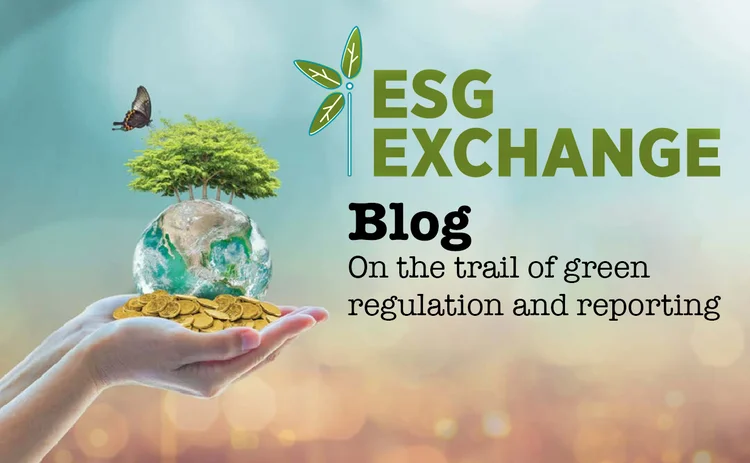
ESG Blog: On the trail of green regulation and reporting

With the new rules expected to come into force in 2022, which will make ESG reporting compulsory for big companies, Allianz's head of strategy and propositions Glen Clarke, considers what companies will need to do to account not just for their own emissions but those of their suppliers.
This year (2022) is looks as if it will be the year of the sustainable push. After COP26 last year, where financial service businesses came out feeling the ambition showed was lacking, now is the time for financial services to set an example to the rest of the UK.
The insurance industry has shown huge ambition and potential in the field of innovation and progress when it comes to technology. Why not use that and show that we can also lead the way in support of sustainable solutions and operations?
Over the next few years, a company’s environmental performance could become a new competitive factor to drive business and increase an industry foothold. Those businesses that can show better awareness and proactiveness around environmental factors and processes will be more attractive to potential customers and commercial clients, and this is a useful marketing tactic.
However, this cannot be a driving force for why a business adopts sustainable solutions; it needs to be a genuine desire to be more environmentally conscious.
The Net Zero Insurer Alliance is part of the wider Glasgow Financial Alliance for Net Zero, which encompasses and includes more than 450 financial firms across 45 countries, with combined assets of more than $130trn (£99trn). The NZIA commits its members to measure and reduce greenhouse gas emissions of not just their own operation, but of their entire portfolio. To be a member of the alliance, businesses must sign up to the Race to Zero initiative, which is the United Nations-backed campaign encouraging businesses to commit to science-based targets supporting the reduction of global emissions by 50% by 2030 and – ultimately – Net Zero by 2050.
Within insurance, governing bodies and establishments are creating a world where sustainability in the wider world is key.
Within insurance, governing bodies and establishments are creating a world where sustainability in the wider world is key
From 1 January 2022, Lloyd’s has asked its managing agents to no longer provide new insurance coverages or investment in activities such as thermal coal-fired power plants, thermal coal mines, oil sands and Arctic energy exploration. By 1 January 2030, those agents will have phased out all existing coverages for those activities, and the Lloyd’s corporation will have already achieved it four years previously, by the fourth quarter of 2025.
Emerging regulations and requirements
The NZIA regulation and requirements are starting to emerge. Currently, companies are looking at their own carbon footprint, focusing on how they can change their own operations to become more sustainable – and rightly so.
But where is this going? What can we expect to be asked of us in the future?
Those financial companies with a large client base and portfolio will need to start looking into their clients’ operations. Soon, these companies won’t just have to start providing reports on their sustainability performance, they will also need to start providing reports on what their clients are doing, and how they are helping them to achieve Net Zero operations.
This is a complicated process, and one that will take a lot of time gathering data, looking at potentially bespoke solutions for different clients depending on their operations, and providing evidence that they are doing what they can to help those clients on their journey.
This is an opportunity for the industry to be at the forefront of the fight against climate change, and lead the journey to Net Zero, and the regulation that is being put in place is backing that up. Let’s outperform.

Post’s ESG Exchange
This article is part of Post’s ESG Exchange from 7 to 18 March featuring free to access webinars, blogs and interviews focusing on ESG.
Today ESG is a powerful tool in the insurance industry, presenting both risks and opportunities for businesses. Register now to watch any of the ESG focused webinars, and have the opportunity to explore and read future content online.
- What do SMART environmental goals look like for the insurance industry?
- Implementing ESG practices across the insurance supply chain.
- What are some of the challenges in creating a more diverse workforce?
- Which area of business should you focus on first in implementing the ESG Agenda
- Will ESG reputation end up being one of the top attractions for insurers in terms of investments?
To register, please click here
Only users who have a paid subscription or are part of a corporate subscription are able to print or copy content.
To access these options, along with all other subscription benefits, please contact info@postonline.co.uk or view our subscription options here: https://subscriptions.postonline.co.uk/subscribe
You are currently unable to print this content. Please contact info@postonline.co.uk to find out more.
You are currently unable to copy this content. Please contact info@postonline.co.uk to find out more.
Copyright Infopro Digital Limited. All rights reserved.
As outlined in our terms and conditions, https://www.infopro-digital.com/terms-and-conditions/subscriptions/ (point 2.4), printing is limited to a single copy.
If you would like to purchase additional rights please email info@postonline.co.uk
Copyright Infopro Digital Limited. All rights reserved.
You may share this content using our article tools. As outlined in our terms and conditions, https://www.infopro-digital.com/terms-and-conditions/subscriptions/ (clause 2.4), an Authorised User may only make one copy of the materials for their own personal use. You must also comply with the restrictions in clause 2.5.
If you would like to purchase additional rights please email info@postonline.co.uk








